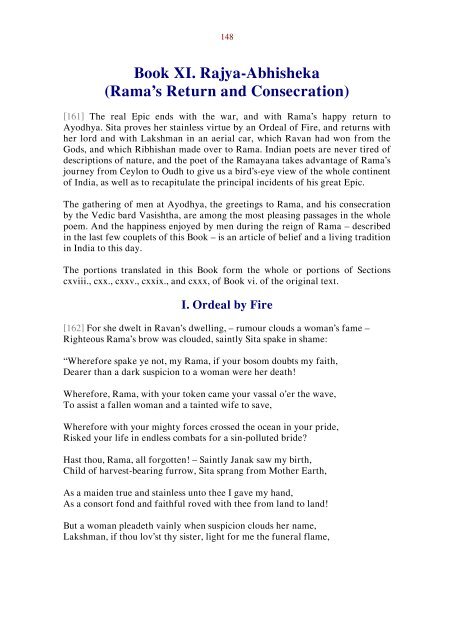Ramayana, Epic of Rama, Prince of India
An Abbreviated Translation of the Indian Classic, the Ramayana by Romesh Chundar Dutt in 2,000 verses
An Abbreviated Translation of the Indian Classic, the Ramayana by Romesh Chundar Dutt in 2,000 verses
You also want an ePaper? Increase the reach of your titles
YUMPU automatically turns print PDFs into web optimized ePapers that Google loves.
148<br />
Book XI. Rajya-Abhisheka<br />
(<strong>Rama</strong>’s Return and Consecration)<br />
[161] The real <strong>Epic</strong> ends with the war, and with <strong>Rama</strong>’s happy return to<br />
Ayodhya. Sita proves her stainless virtue by an Ordeal <strong>of</strong> Fire, and returns with<br />
her lord and with Lakshman in an aerial car, which Ravan had won from the<br />
Gods, and which Ribhishan made over to <strong>Rama</strong>. <strong>India</strong>n poets are never tired <strong>of</strong><br />
descriptions <strong>of</strong> nature, and the poet <strong>of</strong> the <strong><strong>Rama</strong>yana</strong> takes advantage <strong>of</strong> <strong>Rama</strong>’s<br />
journey from Ceylon to Oudh to give us a bird’s-eye view <strong>of</strong> the whole continent<br />
<strong>of</strong> <strong>India</strong>, as well as to recapitulate the principal incidents <strong>of</strong> his great <strong>Epic</strong>.<br />
The gathering <strong>of</strong> men at Ayodhya, the greetings to <strong>Rama</strong>, and his consecration<br />
by the Vedic bard Vasishtha, are among the most pleasing passages in the whole<br />
poem. And the happiness enjoyed by men during the reign <strong>of</strong> <strong>Rama</strong> – described<br />
in the last few couplets <strong>of</strong> this Book – is an article <strong>of</strong> belief and a living tradition<br />
in <strong>India</strong> to this day.<br />
The portions translated in this Book form the whole or portions <strong>of</strong> Sections<br />
cxviii., cxx., cxxv., cxxix., and cxxx, <strong>of</strong> Book vi. <strong>of</strong> the original text.<br />
I. Ordeal by Fire<br />
[162] For she dwelt in Ravan’s dwelling, – rumour clouds a woman’s fame –<br />
Righteous <strong>Rama</strong>’s brow was clouded, saintly Sita spake in shame:<br />
“Wherefore spake ye not, my <strong>Rama</strong>, if your bosom doubts my faith,<br />
Dearer than a dark suspicion to a woman were her death!<br />
Wherefore, <strong>Rama</strong>, with your token came your vassal o’er the wave,<br />
To assist a fallen woman and a tainted wife to save,<br />
Wherefore with your mighty forces crossed the ocean in your pride,<br />
Risked your life in endless combats for a sin-polluted bride?<br />
Hast thou, <strong>Rama</strong>, all forgotten! – Saintly Janak saw my birth,<br />
Child <strong>of</strong> harvest-bearing furrow, Sita sprang from Mother Earth,<br />
As a maiden true and stainless unto thee I gave my hand,<br />
As a consort fond and faithful roved with thee from land to land!<br />
But a woman pleadeth vainly when suspicion clouds her name,<br />
Lakshman, if thou lov’st thy sister, light for me the funeral flame,

















